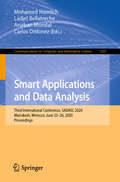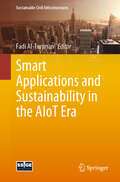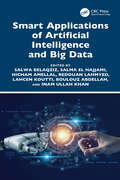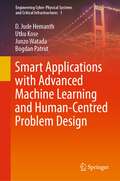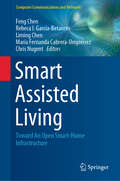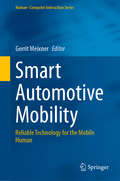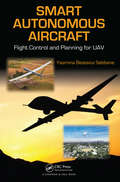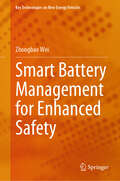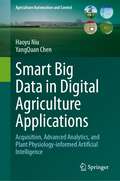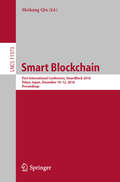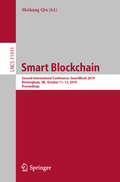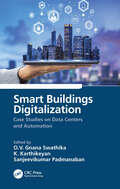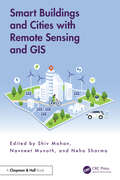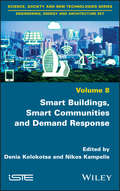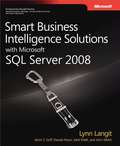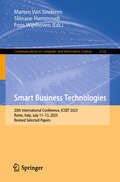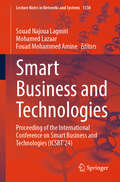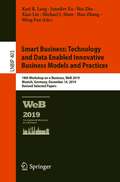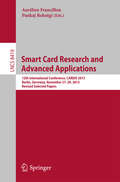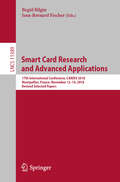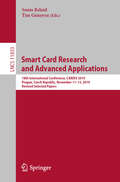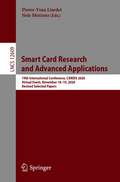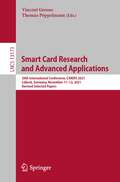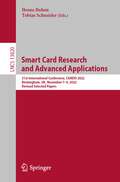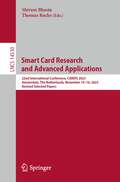- Table View
- List View
Smart Applications and Data Analysis: Third International Conference, SADASC 2020, Marrakesh, Morocco, June 25–26, 2020, Proceedings (Communications in Computer and Information Science #1207)
by Ladjel Bellatreche Carlos Ordonez Anirban Mondal Mohamed HamlichThis volume constitutes refereed proceedings of the Third International Conference on Smart Applications and Data Analysis, SADASC 2020, held in Marrakesh, Morocco. Due to the COVID-19 pandemic the conference has been postponed to June 2020. The 24 full papers and 3 short papers presented were thoroughly reviewed and selected from 44 submissions. The papers are organized according to the following topics: ontologies and meta modeling; cyber physical systems and block-chains; recommender systems; machine learning based applications; combinatorial optimization; simulations and deep learning.
Smart Applications and Sustainability in the AIoT Era (Sustainable Civil Infrastructures)
by Fadi Al-TurjmanThis book gathers recent research work on emerging Artificial Intelligence (AI) methods for processing and storing data generated by smart infrastructures. Smart infrastructures gather Terabytes of data nowadays with no need for traditional control. The data automatically uploads to the cloud computing platform. The cloud analyses the data and generates the required output in visualization, graph, and action. A remote access network can be constructed dependent on either low-elevation or high-altitude stages. When associated with satellite and earthly frameworks, these stages empower a far-reaching access network with worldwide inclusion and diverse administration provisioning. Data analytics are used in agriculture, mining, waste management, energy, and military defenses. Major topics covered include the analysis and development of AI-powered mechanisms in future IoT and smart infrastructures applications. Further, the book addresses new technological developments, current research trends, and industry needs. Presenting case studies, experience and evaluation reports, and best practices in utilizing AI applications in IoT networks, it strikes a good balance between theoretical and practical issues. It also provides technical/scientific information on various aspects of AI technologies, ranging from basic concepts to research grade material, including future directions. The book is intended for researchers, practitioners, engineers and scientists involved in the design and development of protocols and AI applications for smart and sustainable infrastructure-related devices.
Smart Applications of Artificial Intelligence and Big Data (Advances in Digital Technologies for Smart Applications)
by Inam Ullah Khan Salma El Hajjami Salwa Belaqziz Hicham Amellal Redouan Lahmyed Lahcen Koutti Boulouz AbdellahSmart Applications of Artificial Intelligence and Big Data covers a wide range of topics related to AI and big data, including machine learning, deep learning, natural language processing, computer vision, data analytics, and data mining. It focuses on the integration of these technologies to create smart applications, such as intelligent transportation systems, smart healthcare, smart cities, and smart grids.This book comprises 21 chapters, each providing technical details pertaining to research, practical examples, and case studies to help readers understand the real-world applications of AI and big data technologies. The book also highlights cutting-edge research on AI and big data, including novel algorithms, tools, and techniques. It discusses the challenges and opportunities of using AI and big data to develop smart applications and provides recommendations for the development of responsible and transparent AI-based systems. This book is a valuable resource for researchers and professionals looking to stay up-to-date with the latest advancements in AI and big data and how they can be applied to solve real-world challenges.
Smart Applications with Advanced Machine Learning and Human-Centred Problem Design (Engineering Cyber-Physical Systems and Critical Infrastructures #1)
by Junzo Watada D. Jude Hemanth Bogdan Patrut Utku KoseThis book brings together the most recent, quality research papers accepted and presented in the 3rd International Conference on Artificial Intelligence and Applied Mathematics in Engineering (ICAIAME 2021) held in Antalya, Turkey between 1-3 October 2021. Objective of the content is to provide important and innovative research for developments-improvements within different engineering fields, which are highly interested in using artificial intelligence and applied mathematics. As a collection of the outputs from the ICAIAME 2021, the book is specifically considering research outcomes including advanced use of machine learning and careful problem designs on human-centred aspects. In this context, it aims to provide recent applications for real-world improvements making life easier and more sustainable for especially humans. The book targets the researchers, degree students, and practitioners from both academia and the industry.
Smart Assisted Living: Toward An Open Smart-Home Infrastructure (Computer Communications and Networks)
by Feng Chen Liming Chen Rebeca I. García-Betances María Fernanda Cabrera-Umpiérrez Chris NugentSmart Homes (SH) offer a promising approach to assisted living for the ageing population. Yet the main obstacle to the rapid development and deployment of Smart Home (SH) solutions essentially arises from the nature of the SH field, which is multidisciplinary and involves diverse applications and various stakeholders. Accordingly, an alternative to a one-size-fits-all approach is needed in order to advance the state of the art towards an open SH infrastructure.This book makes a valuable and critical contribution to smart assisted living research through the development of new effective, integrated, and interoperable SH solutions. It focuses on four underlying aspects: (1) Sensing and Monitoring Technologies; (2) Context Interference and Behaviour Analysis; (3) Personalisation and Adaptive Interaction, and (4) Open Smart Home and Service Infrastructures, demonstrating how fundamental theories, models and algorithms can be exploited to solve real-world problems.This comprehensive and timely book offers a unique and essential reference guide for policymakers, funding bodies, researchers, technology developers and managers, end users, carers, clinicians, healthcare service providers, educators and students, helping them adopt and implement smart assisted living systems.
Smart Automotive Mobility: Reliable Technology for the Mobile Human (Human–Computer Interaction Series)
by Gerrit MeixnerThis book focuses on smart results in the field of smart automotive mobility concentrating on (semi-)autonomous cars. The results are based on 5 recently finished public-funded research projects with a budget of over 15 million Euro. Providing insights into the next generation of personalized mobility on the road the authors discuss personalized, adaptive cooperative systems for highly automated cars and how they can be developed in a human-centered way. Furthermore, the book reports on a cooperative driver-vehicle interaction. How can the driver and the vehicle support each other? What are their best skills and how can they benefit from each other? It also gives novel insights on intuitive steering gestures on the steering wheel which initiate maneuvers to be executed by the automation, and to be supervised by, influenced or interrupted by the driver. The book finishes with information on a cooperative laser beam system which improves the communication between the different road participants to optimize the road safety of tomorrow. Smart Automotive Mobility: Reliable Technology for the Mobile Human is an ideal source for researchers, students and practitioners working in the area of intelligent systems for the automotive industry. It gives valuable and condensed information from multi-million Euro research projects funded by the German Federal Ministry of Education and Research.
Smart Autonomous Aircraft: Flight Control and Planning for UAV
by Yasmina Bestaoui SebbaneWith the extraordinary growth of Unmanned Aerial Vehicles (UAV) in research, military, and commercial contexts, there has been a need for a reference that provides a comprehensive look at the latest research in the area. Filling this void, Smart Autonomous Aircraft: Flight Control and Planning for UAV introduces the advanced methods of flight contr
Smart Battery Management for Enhanced Safety (Key Technologies on New Energy Vehicles)
by Zhongbao WeiThis book consolidates studies in the rapidly and foreseeably growing field of battery management. The primary focus is to overview the management of batteries (Li-ion batteries and some cases of flow batteries) with the fusion of mechanism and AI-based approaches. The book can be categorized into three groups, i.e., (i) mechanism and AI-based battery modeling and parameterization, (ii) AI-based diagnostic, early warning, and active safety control, and (iii) emerging techniques of smart battery and smart management, combining the emerging areas of embedded sensing and reconfigurable batteries. It is well recognized that the battery safety and management are the kernel of energy storage, renewable utilization, and low-carbon society, which have been highly popular in recent years. The exploration of AI techniques for advanced battery management has been seldom discussed systematically before. Moreover, the combination of AI and mechanism approaches can remarkably enhance the battery management, which however has never been focused on in previous books. Therefore, this book can add new knowledge to the paradigm and attract the attention of academics, scientists, engineers, and practitioners. It is a reference book for researchers and engineers in related fields. The step-by-step guidance, comprehensive introduction, and case studies make it accessible to audiences of different levels, from graduates to experienced engineers.
Smart Big Data in Digital Agriculture Applications: Acquisition, Advanced Analytics, and Plant Physiology-informed Artificial Intelligence (Agriculture Automation and Control)
by YangQuan Chen Haoyu NiuIn the dynamic realm of digital agriculture, the integration of big data acquisition platforms has sparked both curiosity and enthusiasm among researchers and agricultural practitioners. This book embarks on a journey to explore the intersection of artificial intelligence and agriculture, focusing on small-unmanned aerial vehicles (UAVs), unmanned ground vehicles (UGVs), edge-AI sensors and the profound impact they have on digital agriculture, particularly in the context of heterogeneous crops, such as walnuts, pomegranates, cotton, etc. For example, lightweight sensors mounted on UAVs, including multispectral and thermal infrared cameras, serve as invaluable tools for capturing high-resolution images. Their enhanced temporal and spatial resolutions, coupled with cost effectiveness and near-real-time data acquisition, position UAVs as an optimal platform for mapping and monitoring crop variability in vast expanses. This combination of data acquisition platforms and advanced analytics generates substantial datasets, necessitating a deep understanding of fractional-order thinking, which is imperative due to the inherent “complexity” and consequent variability within the agricultural process. Much optimism is vested in the field of artificial intelligence, such as machine learning (ML) and computer vision (CV), where the efficient utilization of big data to make it “smart” is of paramount importance in agricultural research. Central to this learning process lies the intricate relationship between plant physiology and optimization methods. The key to the learning process is the plant physiology and optimization method. Crafting an efficient optimization method raises three pivotal questions: 1.) What represents the best approach to optimization? 2.) How can we achieve a more optimal optimization? 3.) Is it possible to demand “more optimal machine learning,” exemplified by deep learning, while minimizing the need for extensive labeled data for digital agriculture? This book details the foundations of the plant physiology-informed machine learning (PPIML) and the principle of tail matching (POTM) framework. It is the 9th title of the "Agriculture Automation and Control" book series published by Springer.
Smart Blockchain: First International Conference, SmartBlock 2018, Tokyo, Japan, December 10–12, 2018, Proceedings (Lecture Notes in Computer Science #11373)
by Meikang QiuThis book constitutes the refereed proceedings of the First International Conference on Smart Blockchain, SmartBlock 2018, held in Tokyo, Japan, in December 2018. The 17 papers presented in this volume were carefully reviewed and selected from 102 submissions. They focus on a broad range of topics in the area of blockchain, from privacy-preserving solutions to designing advanced blockchain mechanism, from empirical studies to practical manuals.
Smart Blockchain: Second International Conference, SmartBlock 2019, Birmingham, UK, October 11–13, 2019, Proceedings (Lecture Notes in Computer Science #11911)
by Meikang QiuThis book constitutes the refereed proceedings of the Second International Conference on Smart Blockchain, SmartBlock 2019, held in Birmingham, UK, in October 2019.The 13 papers presented in this volume were carefully reviewed and selected from 100 submissions. They focus on a broad range of topics in the area of blockchain, from privacy-preserving solutions to designing advanced blockchain mechanism, from empirical studies to practical manuals.
Smart Buildings Digitalization: Case Studies on Data Centers and Automation
by O.V. Gnana SwathikaThis book explains the concept of data centers, including data collection, public parking systems, smart metering, and sanitizer dispensers. Electric urban transport systems and effective electric distribution in smart cities are discussed as well. The extensive role of power electronics in smart building applications, such as electric vehicles, rooftop terracing, and renewable energy integration, is included. Case studies on automation in smart homes and commercial and official buildings are elaborated. This book describes the complete implication of smart buildings via industrial, commercial, and community platforms. FEATURES Systematically defines energy-efficient buildings employing power consumption optimization techniques with the inclusion of renewable energy sources Covers data centers and cybersecurity with excellent data storage features for smart buildings Includes systematic and detailed strategies for building air-conditioning and lighting Details smart building security propulsion This book is aimed at graduate students, researchers, and professionals in building systems engineering, architectural engineering, and electrical engineering.
Smart Buildings and Cities with Remote Sensing and GIS
by Shiv Mohan, Navneet Munoth, and Neha SharmaThe built environment is undergoing a profound transformation driven by the integration of cutting-edge geospatial technologies. Smart Buildings and Cities with Remote Sensing and GIS serves as a comprehensive guide to navigating this transformation and bridges the gap between traditional architectural and planning practices and the innovative possibilities of remote sensing (RS) and geographic information systems (GIS). The book demonstrates how architects, planners, and decisionmakers can use GIS and RS to design smarter, context-aware, and eco-friendly urban spaces. It explores innovative approaches for architecture, focusing on geospatial site analysis, net-zero energy building designs, heritage preservation, innovative virtual campus planning methodologies and even futuristic concepts like habitat design on the lunar surface. Key features: • Brings together contemporary geospatial technologies and their applications to address the challenges and opportunities in designing smart buildings and cities.• Provides actionable solutions for professionals, researchers, and policymakers.• Includes global contributions that provide diverse perspectives on smart city and building applications.• Highlights how geospatial data-driven insights can revolutionize decisionmaking processes in urban planning and building design.The work is designed for postgraduate students and researchers in the departments of architecture, planning, and geomatics, geoinformatics, software engineering.
Smart Buildings, Smart Communities and Demand Response
by Denia Kolokotsa Nikos KampelisThis book focuses on near-zero energy buildings (NZEBs), smart communities and microgrids. In this context, demand response (DR) is associated with significant environmental and economic benefits when looking at how electricity grids, communities and buildings can operate optimally. In DR, the consumer becomes a prosumer with an important active role in the exchange of energy on an hourly basis. DR is gradually gaining ground with respect to the reduction of peak loads, grid balancing and dealing with the volatility of renewable energy sources (RES). This transition calls for high environmental awareness and new tools or services that will improve the dynamic as well as secure multidirectional exchange of energy and data. Overall, DR is identified as an important field for technological and market innovations aligned with climate change mitigation policies and the transition to sustainable smart grids in the foreseeable future. Smart Buildings, Smart Communities and Demand Response provides an insight into various intrinsic aspects of DR potential, at the building and the community level.
Smart Business Intelligence Solutions with Microsoft® SQL Server® 2008
by Lynn Langit Kevin S. Goff Davide Mauri Sahil Malik John C. Welchiew reports in Microsoft Office Excel® and Office SharePoint® Serverook
Smart Business Technologies: 20th International Conference, ICSBT 2023, Rome, Italy, July 11–13, 2023, Revised Selected Papers (Communications in Computer and Information Science #2132)
by Marten Van Sinderen Slimane Hammoudi Fons WijnhovenThis book constitutes the refereed post proceedings of the 20th International Conference on Smart Business Technologies, ICSBT 2023, held in Rome, Italy, during July 11–13, 2023. The 9 full papers included in this book were carefully reviewed and selected from 30 submissions. The scope of the conference covers technology-related topics, such as technology platforms, internet of things and web services, but also business-relevant topics, such as business processes, business intelligence, value setting and business strategy. Furthermore, it covers different approaches to address these issues and different possible applications with their own specific business needs and requirements on technology.
Smart Business and Technologies: Proceeding of the International Conference on Smart Business and Technologies (ICSBT’24) (Lecture Notes in Networks and Systems #1330)
by Mohamed Lazaar Souad Najoua Lagmiri Fouad Mohammed AmineThis book covers the theory, applications, and viewpoints on the most recent and upcoming advancements in the fields of complex processes, decision-making, control, and systems and networks. In the well-known lecture notes in networks and systems series, "Smart Business and Technologies" is the most recent entry. The cutting-edge research presented at the International Conference on Smart Business and technology (ICSBT'24) is compiled in this volume, which highlights creative solutions, new developments, and useful applications in the domains of advanced technology and smart business practices. For scholars, professionals, and students hoping to remain on the cutting edge of business innovation and technology breakthroughs, it is a vital resource. Numerous topics, including cyber-physical systems, artificial intelligence, data analytics, IoT-enabled solutions, autonomous systems, control systems, sustainable business models, digital transformation strategies, blockchain applications, smart supply chain management, customer experience optimization, predictive analytics, energy systems, robotics, smart cities, manufacturing, and more, are covered in the series' proceedings and edited volumes on systems and networks. These subjects provide insights into the methods and paradigms that propel advancement in smart business and technology sectors. They are enmeshed in interdisciplinary fields such as applied sciences, engineering, computer science, business, economics, and social sciences.
Smart Business: 18th Workshop on e-Business, WeB 2019, Munich, Germany, December 14, 2019, Revised Selected Papers (Lecture Notes in Business Information Processing #403)
by Xiao Liu Han Zhang Michael J. Shaw Ming Fan Bin Zhu Karl R. Lang Jennifer XuThis book constitutes revised selected papers from the 18th Workshop on e-Business, WeB 2019, which took place in Munich, Germany, in December 2019. The purpose of WeB is to provide a forum for researchers and practitioners to discuss findings, novel ideas, and lessons learned to address major challenges and map out the future directions for e-Business. The WeB 2019 theme was “Smart Business: Technology and Data Enabled Innovative Business Models and Practices.” The 20 papers included in this volume were carefully reviewed and selected from a total of 42 submissions. The contributions are organized in topical sections as follows: crowdfunding and blockchain; business analytics; digital platforms and social media; managing e-Business projects and processes; and global e-Business.
Smart Card Research and Advanced Applications: 12th International Conference, CARDIS 2013, Berlin, Germany, November 27-29, 2013. Revised Selected Papers (Lecture Notes in Computer Science #8419)
by Aurélien Francillon and Pankaj RohatgiThis book constitutes the thoroughly refereed post-conference proceedings of the 12th International Conference on Smart Card Research and Advanced Applications, CARDIS 2013, held in Berlin, Germany, in November 2013. The 17 revised full papers presented in this book were carefully reviewed and selected from 47 submissions. The papers are organized in topical sections on security technologies; attacks on masking; side channel attacks; software and protocol analysis; side channel countermeasures; and side channel and fault attacks.
Smart Card Research and Advanced Applications: 17th International Conference, CARDIS 2018, Montpellier, France, November 12–14, 2018, Revised Selected Papers (Lecture Notes in Computer Science #11389)
by Begül Bilgin Jean-Bernard FischerThis book constitutes the thoroughly refereed post-conference proceedings of the 17th International Conference on Smart Card Research and Advanced Applications, CARDIS 2018, held in Monpellier, France, in November 2018.The 13 revised full papers presented in this book were carefully reviewed and selected from 28 submissions. CARDIS has provided a space for security experts from industry and academia to exchange on security of smart cards and related applications.
Smart Card Research and Advanced Applications: 18th International Conference, CARDIS 2019, Prague, Czech Republic, November 11–13, 2019, Revised Selected Papers (Lecture Notes in Computer Science #11833)
by Tim Güneysu Sonia BelaïdThis book constitutes the thoroughly refereed post-conference proceedings of the 18th International Conference on Smart Card Research and Advanced Applications, CARDIS 2019, held in Prague, Czech Republic, in November 2019. The 15 revised full papers presented in this book were carefully reviewed and selected from 31 submissions. The papers are organized in the following topical sections: system-on-a-chip security; post-quantum cryptography; side-channel analysis; microarchitectural attacks; cryptographic primitives; advances in side-channel analysis. CARDIS has provided a space for security experts from industry and academia to exchange on security of smart cards and related applications.
Smart Card Research and Advanced Applications: 19th International Conference, CARDIS 2020, Virtual Event, November 18–19, 2020, Revised Selected Papers (Lecture Notes in Computer Science #12609)
by Pierre-Yvan Liardet Nele MentensThis book constitutes the proceedings of the 19th International Conference on Smart Card Research and Advanced Applications, CARDIS 2020, which took place during November 18-20, 2020. The conference was originally planned to take place in Lübeck, Germany, and changed to an online format due to the COVID-19 pandemic. The 12 full papers presented in this volume were carefully reviewed and selected from 26 submissions. They were organized in topical sections named: post-quantum cryptography; efficient implementations; and physical attacks.
Smart Card Research and Advanced Applications: 20th International Conference, CARDIS 2021, Lübeck, Germany, November 11–12, 2021, Revised Selected Papers (Lecture Notes in Computer Science #13173)
by Vincent Grosso Thomas PöppelmannThis book constitutes the proceedings of the 20th International Conference on Smart Card Research and Advanced Applications, CARDIS 2021, which took place in November 2021. The conference took place in Lübeck, Germany, and changed to a hybrid format due to the COVID-19 pandemic.The 16 full papers presented in this volume were carefully reviewed and selected from 32 submissions. They were organized in topical sections named Side-Channel Attacks, Fault Attacks, Public Key and Secure Implementations.
Smart Card Research and Advanced Applications: 21st International Conference, CARDIS 2022, Birmingham, UK, November 7–9, 2022, Revised Selected Papers (Lecture Notes in Computer Science #13820)
by Ileana Buhan Tobias SchneiderThis book constitutes the proceedings of the 21st International Conference on Smart Card Research and Advanced Applications, CARDIS 2022, which took place in November 2022. The conference took place in Birmingham, United Kingdom. The 15 full papers presented in this volume were carefully reviewed and selected from 29 submissions. They were organized in topical sections named: physical attacks; physical countermeasures; protecting AES; evaluation methodologies; attacking NTRU; next-generation cryptography.
Smart Card Research and Advanced Applications: 22nd International Conference, CARDIS 2023, Amsterdam, The Netherlands, November 14–16, 2023, Revised Selected Papers (Lecture Notes in Computer Science #14530)
by Thomas Roche Shivam BhasinThis book constitutes the proceedings of the 22nd International Conference on Smart Card Research and Advanced Applications, CARDIS 2023, held in Amsterdam, The Netherlands, during November 14–16, 2023.The 13 full papers presented in this volume were carefully reviewed and selected from 28 submissions. They were organized in topical sections as follows: fault attacks; side-channel analysis; smartcards & efficient Implementations; and side-channel & neural networks.
